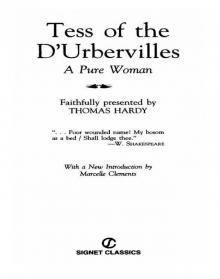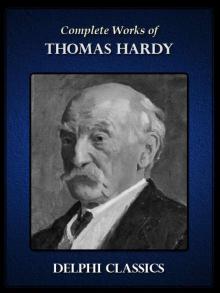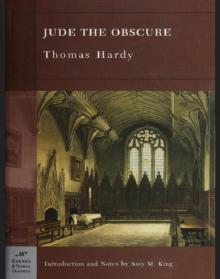- Home
- Thomas Hardy
The Distracted Preacher Page 2
The Distracted Preacher Read online
Page 2
Stockdale sat in the deep chair about twenty minutes sipping and meditating, till he at length took warmer views of things, and longed for the morrow, when he would see Mrs. Newberry again. He then felt that, though chronologically at a short distance, it would, in an emotional sense, be very long before to-morrow came, and walked restlessly round the room. His eye was attracted by a framed and glazed sampler in which a running ornament of fir-trees and peacocks surrounded the following pretty bit of sentiment:
“Rose-leaves smell when roses thrive,
Here’s my work while I’m alive;
Rose-leaves smell when shrunk and shed,
Here’s my work when I am dead.
“Lizzy Simpkins. Fear God. Honor the King. Aged 11 years.”
“’Tis hers,” he said to himself. “Heavens, how I like that name!”
Before he had done thinking that no other name from Abigail to Zenobia would have suited his young landlady so well, tap-tap came again upon the door; and the minister started as her face appeared yet another time, looking so disinterested that the most ingenious would have refrained from asserting that she had come to affect his feelings by her seductive eyes.
“Would you like a fire in your room, Mr. Stockdale, on account of your cold?”
The minister, being still a little pricked in the conscience for countenancing her in watering the spirits, saw here a way to self-chastisement. “No, I thank you,” he said firmly; “it is not necessary. I have never been used to one in my life, and it would be giving way to luxury too far.”
“Then I won’t insist,” she said, and disconcerted him by vanishing instantly.
Wondering if she was vexed by his refusal, he wished that he had chosen to have a fire, even though it should have scorched him out of bed and endangered his self-discipline for a dozen days. However, he consoled himself with what was in truth a rare consolation for a budding lover, that he was under the same roof with Lizzy—her guest, in fact, to take a poetical view of the term lodger; and that he would certainly see her on the morrow.
The morrow came, and Stockdale rose early, his cold quite gone. He had never in his life so longed for the breakfast-hour as he did that day, and punctually at eight o’clock, after a short walk, to reconnoitre the premises, he re-entered the door of his dwelling. Breakfast passed, and Martha Sarah attended, but nobody came voluntarily as on the night before to inquire if there were other wants which he had not mentioned, and which she would attempt to gratify. He was disappointed, and went out, hoping to see her at dinner. Dinner-time came; he sat down to the meal, finished it, lingered on for a whole hour, although two new teachers were at that moment waiting at the chapel door to speak to him by appointment. It was useless to wait longer, and he slowly went his way down the lane, cheered by the thought that, after all, he would see her in the evening, and perhaps engage again in the delightful tub-broaching in the neighboring church tower, which proceeding he resolved to render more moral by steadfastly insisting that no water should be introduced to fill up, though the tub should cluck like all the hens in Christendom. But nothing could disguise the fact that it was a queer business; and his countenance fell when he thought how much more his mind was interested in that matter than in his serious duties.
However, compunction vanished with the decline of day. Night came, and his tea and supper; but no Lizzy Newberry, and no sweet temptations. At last the minister could bear it no longer, and said to his quaint little attendant, “Where is Mrs. Newberry to-day?” judiciously handing a penny as he spoke.
“She’s busy,” said Martha.
“Anything serious happened?” he asked, handing another penny, and revealing yet additional pennies in the background.
“Oh no, nothing at all!” said she, with breathless confidence. “Nothing ever happens to her. She’s only biding up-stairs in bed, because ’tis her way sometimes.”
Being a young man of some honor, he would not question further, and assuming that Lizzy must have a bad headache, or other slight ailment, in spite of what the girl had said, he went to bed dissatisfied, not even setting eyes on old Mrs. Simpkins. “I said last night that I should see her to-morrow,” he reflected; “but that was not to be!”
Next day he had better fortune, or worse, meeting her at the foot of the stairs in the morning, and being favored by a visit or two from her during the day—once for the purpose of making kindly inquiries about his comfort, as on the first evening, and at another time to place a bunch of winter-violets on his table, with a promise to renew them when they drooped. On these occasions there was something in her smile which showed how conscious she was of the effect she produced, though it must be said that it was rather a humorous than a designing consciousness, and savored more of pride than of vanity.
As for Stockdale, he clearly perceived that he possessed unlimited capacity for backsliding, and wished that tutelary saints were not denied to Dissenters. He set a watch upon his tongue and eyes for the space of one hour and a half, after which he found it was useless to struggle further, and gave himself up to the situation. “The other minister will be here in a month,” he said to himself when sitting over the fire. “Then I shall be off, and she will distract my mind no more! . . . And then, shall I go on living by myself forever? No; when my two years of probation are finished, I shall have a furnished house to live in, with a varnished door and a brass knocker; and I’ll march straight back to her, and ask her flat, as soon as the last plate is on the dresser!”
Thus a titillating fortnight was passed by young Stockdale, during which time things proceeded much as such matters have done ever since the beginning of history. He saw the object of attachment several times one day, did not see her at all the next, met her when he least expected to do so, missed her when hints and signs as to where she should be at a given hour almost amounted to an appointment. This mild coquetry was perhaps fair enough under the circumstances of their being so closely lodged, and Stockdale put up with it as philosophically as he was able. Being in her own house, she could, after vexing or disappointing him of her presence, easily win him back by suddenly surrounding him with those little attentions which her position as his landlady put it in her power to bestow. When he had waited in-doors half the day to see her, and on finding that she would not be seen, had gone off in a huff to the dreariest and dampest walk he could discover, she would restore equilibrium in the evening with “Mr. Stockdale, I have fancied you must feel draught o’ nights from your bedroom window, and so I have been putting up thicker curtains this afternoon while you were out;” or “I noticed that you sneezed twice again this morning, Mr. Stockdale. Depend upon it, that cold is hanging about you yet; I am sure it is—I have thought of it continually; and you must let me make a posset for you.”
Sometimes in coming home he found his sitting-room rearranged, chairs placed where the table had stood, and the table ornamented with the few fresh flowers and leaves that could be obtained at this season, so as to add a novelty to the room. At times she would be standing on a chair outside the house, trying to nail up a branch of the monthly rose which the winter wind had blown down; and of course he stepped forward to assist her, when their hands got mixed in passing the shreds and nails. Thus they became friends again after a disagreement. She would utter on these occasions some pretty and deprecatory remark on the necessity of her troubling him anew; and he would straightway say that he would do a hundred times as much for her if she should so require.
CHAPTER II
HOW HE SAW TWO OTHER MEN
Matters being in this advanced state, Stockdale was rather surprised one cloudy evening, while sitting in his room, at hearing her speak in low tones of expostulation to some one at the door. It was nearly dark, but the shutters were not yet closed, nor the candles lighted; and Stockdale was tempted to stretch his head towards the window. He saw outside the door a young man in clothes of a whitish color, and upon reflection judged their wearer to be the well-built and rather handsome miller who lived below. The
miller’s voice was alternately low and firm, and sometimes it reached the level of positive entreaty; but what the words were Stockdale could in no way hear.
Before the colloquy had ended, the minister’s attention was attracted by a second incident. Opposite Lizzy’s home grew a clump of laurels, forming a thick and permanent shade. One of the laurel boughs now quivered against the light background of sky, and in a moment the head of a man peered out, and remained still. He seemed to be also much interested in the conversation at the door, and was plainly lingering there to watch and listen. Had Stockdale stood in any other relation to Lizzy than that of a lover, he might have gone out and investigated the meaning of this; but being as yet but an unprivileged ally, he did nothing more than stand up and show himself in the lighted room, whereupon the listener disappeared, and Lizzy and the miller spoke in lower tones.
Stockdale was made so uneasy by the circumstance that as soon as the miller was gone, he said, “Mrs. Newberry, are you aware that you were watched just now, and your conversation heard?”
“When?” she said.
“When you were talking to that miller. A man was looking from the laurel-tree as jealously as if he could have eaten you.”
She showed more concern than the trifling event seemed to demand, and he added, “Perhaps you were talking of things you did not wish to be overheard?”
“I was talking only on business,” she said.
“Lizzy, be frank!” said the young man. “If it was only on business, why should anybody wish to listen to you?”
She looked curiously at him. “What else do you think it could be, then?”
“Well, the only talk between a young woman and man that is likely to amuse an eavesdropper.”
“Ah yes,” she said, smiling in spite of her preoccupation. “Well, Cousin Owlett has spoken to me about matrimony, every now and then, that’s true; but he was not speaking of it then. I wish he had been speaking of it, with all my heart. It would have been much less serious for me.”
“Oh, Mrs. Newberry!”
“It would. Not that I should ha’ chimed in with him, of course. I wish it for other reasons. I am glad, Mr. Stockdale, that you have told me of that listener. It is a timely warning, and I must see my cousin again.”
“But don’t go away till I have spoken,” said the minister. “I’ll out with it at once, and make no more ado. Let it be Yes or No between us, Lizzy, please do!” And he held out his hand, in which she freely allowed her own to rest, but without speaking.
“You mean Yes by that?” he asked, after waiting a while.
“You may be my sweetheart, if you will.”
“Why not say at once you will wait for me until I have a house and can come back to marry you?”
“Because I am thinking—thinking of something else,” she said with embarrassment. “It all comes upon me at once, and I must settle one thing at a time.”
“At any rate, dear Lizzy, you can assure me that the miller shall not be allowed to speak to you except on business? You have never directly encouraged him?”
She parried the question by saying, “You see, he and his party have been in the habit of leaving things on my premises sometimes, and as I have not denied him, it makes him rather forward.”
“Things—what things?”
“Tubs—they are called things here.”
“But why don’t you deny him, my dear Lizzy?”
“I cannot well.”
“You are too timid. It is unfair of him to impose so upon you, and get your good name into danger by his smuggling tricks. Promise me that the next time he wants to leave his tubs here you will let me roll them into the street?”
She shook her head. “I would not venture to offend the neighbors so much as that,” said she, “or do anything that would be so likely to put poor Owlett into the hands of the excisemen.”
Stockdale sighed, and said that he thought hers a mistaken generosity when it extended to assisting those who cheated the King of his dues. “At any rate, you will let me make him keep his distance as your lover, and tell him flatly that you are not for him?”
“Please not, at present,” she said. “I don’t wish to offend my old neighbors. It is not only Owlett who is concerned.”
“This is too bad,” said Stockdale, impatiently.
“On my honor, I won’t encourage him as my lover,” Lizzy answered earnestly. “A reasonable man will be satisfied with that.”
“Well, so I am,” said Stockdale, his countenance clearing.
CHAPTER III
THE MYSTERIOUS GREAT-COAT
Stockdale now began to notice more particularly a feature in the life of his fair landlady which he had casually observed, but scarcely ever thought of before. It was that she was markedly irregular in her hours of rising. For a week or two she would be tolerably punctual, reaching the ground-floor within a few minutes of half-past seven; then suddenly she would not be visible till twelve at noon, perhaps for three or four days in succession; and twice he had certain proof that she did not leave her room till half-past three in the afternoon. The second time that this extreme lateness came under his notice was on a day when he had particularly wished to consult with her about his future movements; and he concluded, as he always had done, that she had a cold, headache, or other ailment, unless she had kept herself invisible to avoid meeting and talking to him, which he could hardly believe. The former supposition was disproved, however, by her innocently saying, some days later, when they were speaking on a question of health, that she had never had a moment’s heaviness, headache, or illness of any kind since the previous January twelvemonth.
“I am glad to hear it,” said he. “I thought quite otherwise.”
“What, do I look sickly?” she asked, turning up her face to show the impossibility of his gazing on it and holding such a belief for a moment.
“Not at all; I merely thought so from your being sometimes obliged to keep your room through the best part of the day.”
“Oh, as for that—it means nothing,” she murmured, with a look which some might have called cold, and which was the look that he worst liked to see upon her. “It is pure sleepiness, Mr. Stockdale.”
“Never!”
“It is, I tell you. When I stay in my room till half-past three in the afternoon, you may always be sure that I slept soundly till three, or I shouldn’t have stayed there.”
“It is dreadful,” said Stockdale, thinking of the disastrous effects of such indulgence upon the household of a minister, should it become a habit of every-day occurrence.
“But then,” she said, divining his good and prescient thoughts, “it only happens when I stay awake all night. I don’t go to sleep till five or six in the morning sometimes.”
“Ah, that’s another matter,” said Stockdale. “Sleeplessness to such an alarming extent is real illness. Have you spoken to a doctor?”
“Oh no, there is no need for doing that; it is all natural to me.” And she went away without further remark.
Stockdale might have waited a long time to know the real cause of her sleeplessness, had it not happened that one dark night he was sitting in his bedroom jotting down notes for a sermon, which unintentionally occupied him for a considerable time after the other members of the household had retired. He did not get to bed till one o’clock. Before he had fallen asleep he heard a knocking at the front door, first rather timidly performed, and then louder. Nobody answered it, and the person knocked again. As the house still remained undisturbed, Stockdale got out of bed, went to his window, which overlooked the door, and opening it, asked who was there.
A young woman’s voice replied that Susan Wallis was there, and that she had come to ask if Mrs. Newberry could give her some mustard to make a plaster with, as her father was taken very ill on the chest.
The minister, having neither bell nor servant, was compelled to act in person. “I will call Mrs. Newberry,” he said. Partly dressing himself, he went along the passage and tapped at Lizzy�
�s door. She did not answer, and, thinking of her erratic habits in the matter of sleep, he thumped the door persistently, when he discovered, by its moving ajar under his knocking, that it had only been gently pushed to. As there was now a sufficient entry for the voice, he knocked no longer, but said in firm tones, “Mrs. Newberry, you are wanted.”
The room was quite silent; not a breathing, not a rustle, came from any part of it. Stockdale now sent a positive shout through the open space of the door: “Mrs. Newberry!” still no answer, or movement of any kind within. Then he heard sounds from the opposite room, that of Lizzy’s mother, as if she had been aroused by his uproar though Lizzy had not, and was dressing herself hastily. Stockdale softly closed the younger woman’s door and went on to the other, which was opened by Mrs. Simpkins before he could reach it. She was in her ordinary clothes, and had a light in her hand.
“What’s the person calling about?” she said, in alarm.
Stockdale told the girl’s errand, adding seriously, “I cannot wake Mrs. Newberry.”
“It is no matter,” said her mother. “I can let the girl have what she wants as well as my daughter.” And she came out of the room and went down-stairs.
Stockdale retired towards his own apartment, saying, however, to Mrs. Simpkins from the landing, as if on second thoughts, “I suppose there is nothing the matter with Mrs. Newberry, that I could not wake her?”
“Oh no,” said the old lady, hastily. “Nothing at all.”
Still the minister was not satisfied. “Will you go in and see?” he said. “I should be much more at ease.”
Mrs. Simpkins returned up the staircase, went to her daughter’s room, and came out again almost instantly. “There is nothing at all the matter with Lizzy,” she said, and descended again to attend to the applicant, who, having seen the light, had remained quiet during this interval.

 Under the Greenwood Tree; Or, The Mellstock Quire
Under the Greenwood Tree; Or, The Mellstock Quire Tess of the D'Urbervilles
Tess of the D'Urbervilles Desperate Remedies
Desperate Remedies Jude the Obscure
Jude the Obscure Two on a Tower
Two on a Tower Far from the Madding Crowd
Far from the Madding Crowd The Return of the Native
The Return of the Native The Mayor of Casterbridge
The Mayor of Casterbridge The Well-Beloved
The Well-Beloved A Laodicean : A Story of To-day
A Laodicean : A Story of To-day The Woodlanders
The Woodlanders Under the Greenwood Tree
Under the Greenwood Tree Complete Works of Thomas Hardy (Illustrated)
Complete Works of Thomas Hardy (Illustrated) Jude the Obscure (Barnes & Noble Classics Series)
Jude the Obscure (Barnes & Noble Classics Series) The Distracted Preacher
The Distracted Preacher